Flowering Trees and Shrubs
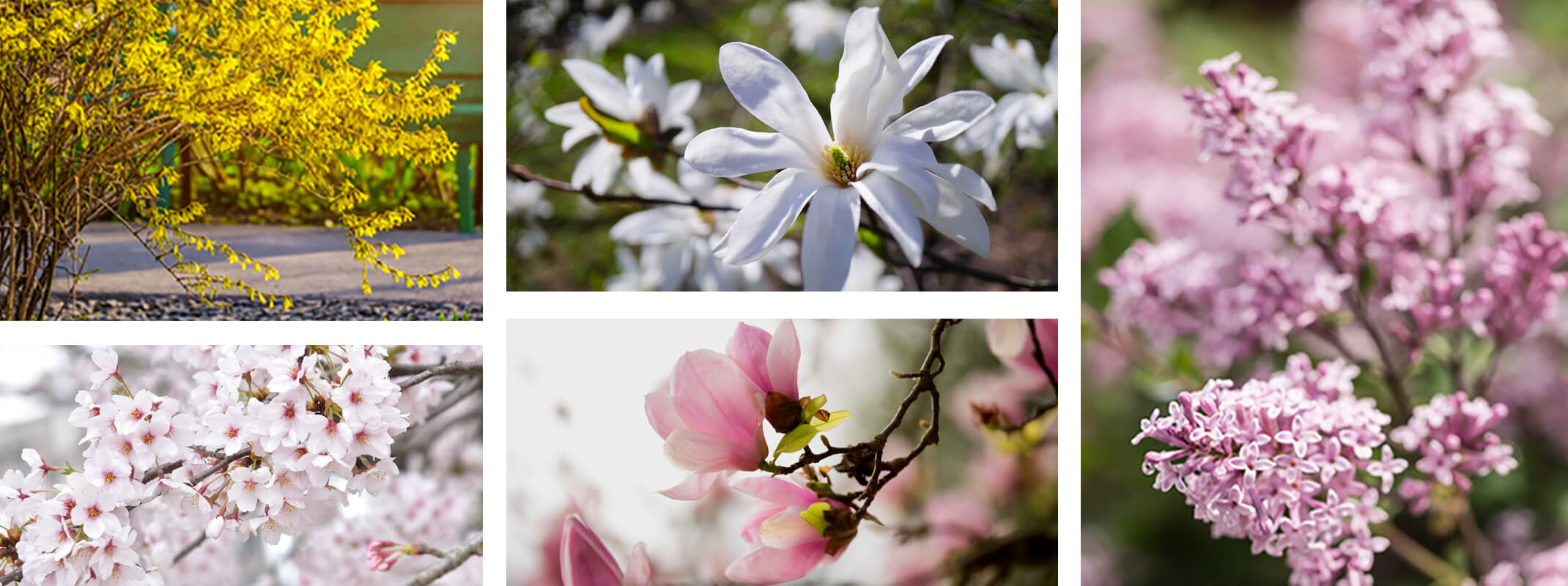 Spring Brings Beautiful Flowering Trees and Shrubs
Spring Brings Beautiful Flowering Trees and Shrubs
While we live in a part of the country that sees some green in our landscape year-round, we can still appreciate springtime when it arrives. And nothing says spring like flowering trees and shrubs. The beautiful buds and blooms of spring is reminiscent of a fresh start. SummerWinds Nursery is loaded with trees and shrubs to give your landscape just that. We have trees and shrubs that can act as a specimen tree, a focal point for your yard, or a lovely addition that can create a privacy screen or hedge. And for those with smaller spaces, we have shrubs and trees perfect for containers or limited space. Check out our beautiful selection of Monrovia® Trees and Shrubs....
Please note - selection may vary by location.
5 Flowering Shrubs: Favored For Spring
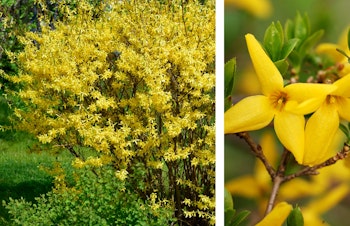
1. Forsythia 'Bronxensis'
Forsythia 'Bronxensis', also known as greenstem forsythia, is a compact deciduous shrub well-suited for the Bay Area of California's growing conditions. It's a low-maintenance plant, ideal for borders, ground cover, and container planting. This dwarf cultivar. The plant is known for its good drought tolerance once established, making it a good choice for slopes where erosion control is needed.
- Growth: 1 foot in height and spreads 2 to 3 feet wide
- Blooms: early in spring
- Light: prefers full sun to part shade
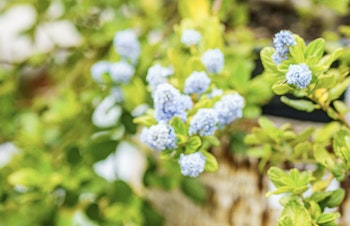
2. Ceanothus 'Diamond Heights'
The Ceanothus 'Diamond Heights', also known as Diamond Heights Carmel creeper, is an attractive low-growing shrub well-suited for the Bay Area gardens in California. This variety is celebrated for its variegated, chartreuse-yellow foliage that has splashes of dark green, providing a bright, year-round color in your garden. The foliage can become more yellow under sunny and warm conditions and remains greener in shady areas and during cooler months. In spring, it produces light blue flowers. An excellent choice for water-wise gardens.
- Growth: 12 inches in height and spreads up to 6 feet.
- Light: light shade, especially near the coast, and requires more sun when planted further inland
- Other: Drought tolerant once established
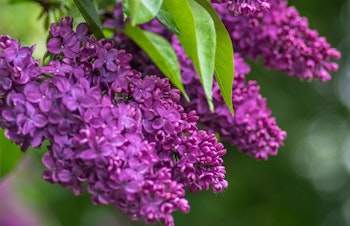
3. Syringa Bloomerang® Dark Purple
The Syringa Bloomerang Dark Purple is a deciduous shrub that's well-suited for the Bay Area's climate. This lilac variety is notable for its long blooming season which stretches from May to October, providing a display of small, fragrant, dark purple flowers that are tubular in shape and clustered on cone-shaped inflorescences. These blooms not only add aesthetic value to gardens but are also effective in attracting pollinators such as butterflies and hummingbirds and make great cutting flowers for indoors.
It makes a great addition to the landscape whether used for hedges, borders, or as a standalone specimen, and its reblooming nature ensures a display of color and fragrance through most of the growing season!
- Growth: can reach a height of 4 to 6 feet and a spread of 3 to 5 feet
- Light: full sun and can tolerate light shade
- Other: Deer-resistant
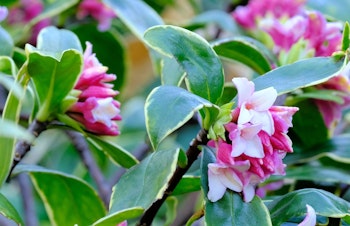
4. Daphne odora 'Marginata'
The Daphne odora 'Marginata', commonly known as the Variegated Winter Daphne, is a broadleaf evergreen shrub appreciated for its variegated leaves with yellow or white edges and its fragrant late winter to early spring flowers. This Daphne variety is known for its fragrant rosy-purple buds that open to reveal white flowers. It is important to note that all parts of this plant are poisonous if ingested.
The Daphne odora 'Marginata' is a favored choice for containers due to its size and ornamental qualities. It can also be used as a specimen plant or integrated into shrub borders, wall side borders, and cottage gardens where its fragrance can be enjoyed.
- Growth: height and spread of 3 to 5 feet
- Light: partial shade
- Other: forming a rounded shape
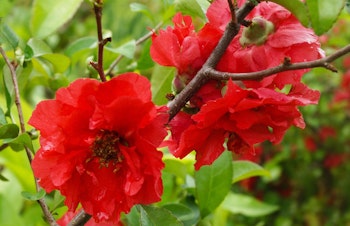
5. Flowering Quince: Chaenomeles
The Flowering Quince, known botanically as Chaenomeles can bring early spring color to the garden with vibrant blooms that can range in color from white and pink to red and orange. In the garden, Flowering Quince can function as a colorful hedge or as an espalier against a wall or fence. Its early blooms can be a delightful precursor to spring, and the branches with buds can be cut and brought indoors to force blooming, extending the enjoyment of their flowers.
- Light: full sun to part shade
- Other: drought-tolerant once established (it's important to maintain consistent moisture during its first year of growth)
Shrubs - Larger Selection!
Lilacs
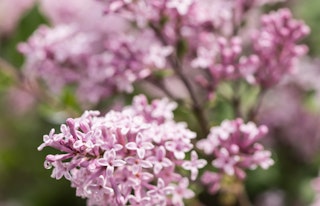
Miss Kim Korean Lilac
Syringa pubescens subsp. patula 'Miss Kim' - This upright, compact lilac blooms later than others, extending the season with deep purple buds that reveal clusters of highly fragrant, lavender-blue flowers. Foliage is burgundy-tinged in fall. Hardy, yet performs in southern regions, with excellent powdery mildew resistance. Great for border accent or mass planting. Deciduous.
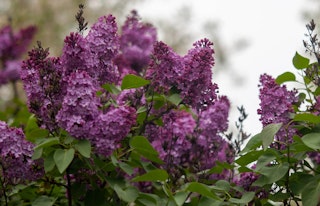
Bloomerang® Dark Purple Lilac
Syringa - Enjoy classic Lilac fragrance for months instead of weeks! This beauty blooms in spring, then reblooms from mid-summer through fall. New Dark Purple is bigger than the original Bloomerang and has larger, more rounded inflorescences. This vigorous grower will add beauty and fragrance to gardens from spring to fall.
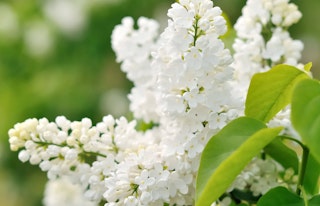
Angel White Lilac
Syringa vulgaris 'Angel White' - One of the best lilacs for warm winter areas. Spectacular clusters of fragrant pure white flowers produced without winter chilling! This midseason bloomer typically flowers in mid-May. The open-branched, upright form makes a great hedge, screen or accent. Deciduous.
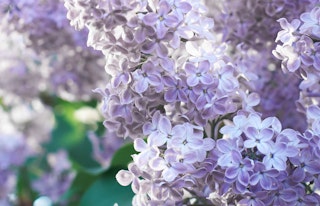
Blue Skies® Lilac
Syringa vulgaris 'Monore' - One of the best lilacs for warm winter areas. Produces spectacular clusters of light lavender-blue flowers without winter chilling! A midseason bloomer that typically flowers in mid-May. Bright green foliage maintains its attractive appearance all summer. Plant near a window or pathway where the fragrant blooms can be enjoyed. Deciduous.
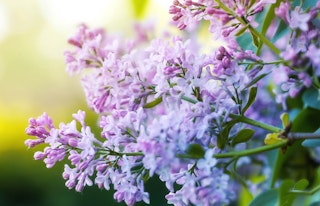
Lavender Lady Lilac
Syringa vulgaris 'Lavender Lady' - One of the best lilacs for warm winter areas, Lavender Lady produces spectacular clusters of fragrant lavender flowers in any part of the country, even without winter chill! Blooms mid-season, typically in mid-May. Open branched, upright form is useful as a hedge, screen or accent. Tolerates mild, periodic drought when established. Deciduous.
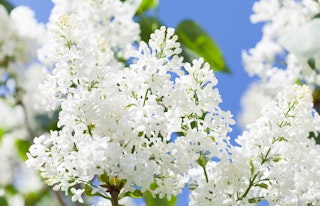
Betsy Ross Lilac
Syringa x oblata 'Betsy Ross' - An early spring bloomer with very large, fragrant, pure white flower panicles on a rounded, multi-trunk shrub with flat, deep green foliage that remains attractive throughout summer and has notable mildew resistance. Useful as an informal screen, background shrub, or spring specimen. A sensational cut flower for a fragrant bouquet. Deciduous.
Forsythia
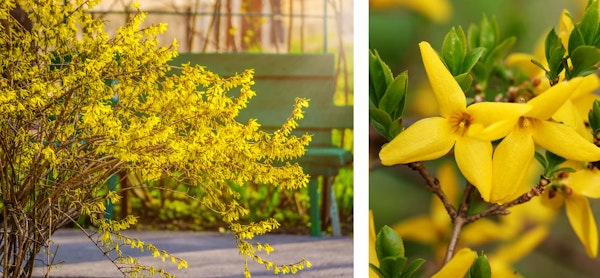 Magical® Gold Forsythia – Forsythia x intermedia 'Kolgold' - Extra large, rich golden yellow flowers completely shroud the bare stems in early spring. Becomes the focal point of the landscape when in full bloom and blends well with other plants when the rich green foliage emerges after the flowers. Deciduous.
Magical® Gold Forsythia – Forsythia x intermedia 'Kolgold' - Extra large, rich golden yellow flowers completely shroud the bare stems in early spring. Becomes the focal point of the landscape when in full bloom and blends well with other plants when the rich green foliage emerges after the flowers. Deciduous.- Light: Full Sun
- Water: Regularly - weekly, or more often in extreme heat.
- Average Landscape Size: Moderate growing; reaches 5 ft. tall, 4 ft.
- Uses: Coastal Exposure, Cutting Garden, Hedge, Mass Planting, Urban Garden, Wildlife Garden
Care: Easy to grow in average to poor, well-drained soils. Best flowering in full sun. Water regularly, deeply during first growing season to establish an extensive root system. Once established, reduce frequency; tolerates periodic drought. Apply fertilizer before new growth begins in spring. Prune to shape immediately after flowering.Pruning time: summer after flowering.
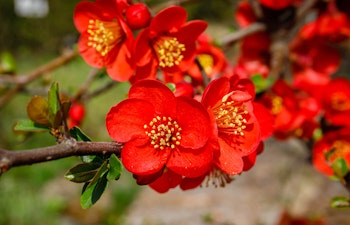
Flowering Quince
Chaenomeles speciosa 'Scarlet Storm' - Absolutely stunning when in bloom. And while available in other colors, this flowering quince's offers a stunning red bloom with a yellow center.
- Light: Prefers full sun
- Water: Occasional water, once established
- Avg. Landscape Size: Up to 6 ft. tall and wide
2 Flowering Vines: Clever Beauties
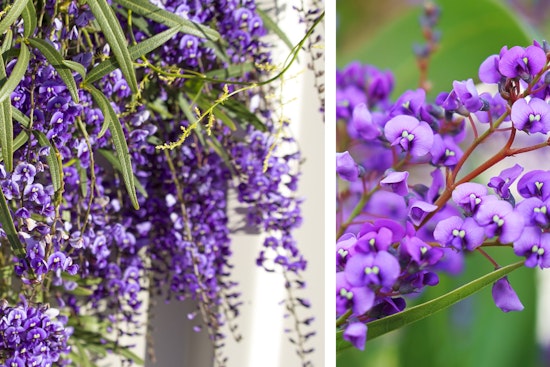 Hardenbergia violacea
Hardenbergia violacea
Hardenbergia violacea, commonly known as Purple Coral Pea or False Sarsaparilla, is a fast-growing, evergreen climbing vine native to Australia. It's highly popular in the Bay Area due to its ability to thrive in mild climates and its stunning display of purple, pea-like flowers that appear in late winter and early spring.
- Light: Thrives in full sun to part shade. For the Bay Area, full sun ensures the best flowering, but it can tolerate light afternoon shade in hotter inland areas.
- Fertilizer: Use a low-phosphorus fertilizer, as it is sensitive to high levels of phosphorus due to its legume roots. Fertilize in early spring and again after flowering.
- Pruning: Prune lightly after flowering to maintain shape, encourage new growth, and control size. Remove any dead or tangled stems.
- Support: Provide a trellis, fence, or arbor for climbing. If grown as a ground cover, it spreads well without additional support.
- Mulching: Add a layer of mulch around the base to retain soil moisture and suppress weeds.
- Pests and Diseases: Generally pest-free, but occasional aphids or spider mites may appear. Treat with insecticidal soap if necessary.
Wisteria
Want to add a little privacy to your outdoor space? How about living shade - full of color? Wisteria is your temptress. Something between a vine and shrub, wisteria blooms vigorously in spring with showy, cascading flower clusters that provide quick-growing color. Please note that not all varieties of Wisteria may be available at all locations.
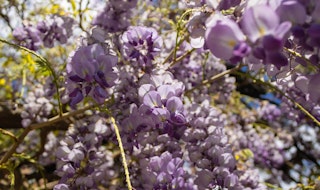
Amethyst Falls American Wisteria
Wisteria frutescens 'Amethyst Falls' - Perfect for smaller spaces, this gorgeous twining vine grows at about a third of the rate of Asian wisteria. Blooms at an early age, with its lightly fragrant purple racemes weeping gracefully downward. Use in containers for porch or patio, train up an arbor or trellis, or as a small free-standing tree. Deciduous.
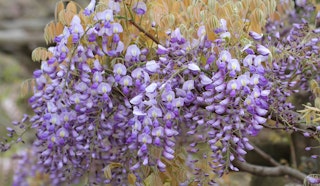
Shiro-Beni Silky Wisteria
Wisteria brachybotrys 'Shiro-Beni' - Lovely racemes, 4 to 6-inches long, thickly covered with dark pink buds that open to highly scented soft pink blooms all at once. A profuse spring bloomer, especially as it ages. An excellent vine for trellis and espalier. Works well in containers and is a wise choice for smaller gardens. Deciduous.
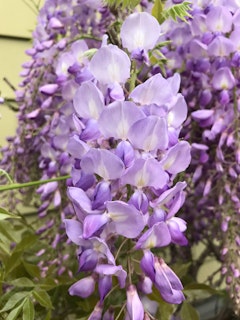
Texas Purple Japanese Wisteria
Wisteria floribunda 'Texas Purple' - Showy, large clusters of sweetly fragrant purple flowers in spring are followed by large, compound, dark green leaves on vigorous twining stems. Best when trained on an arbor, trellis or fence to allow a full view of the spectacular pendulous flower clusters. Blooms at a very early age. Deciduous.
Planting Wisteria
- Grow in fertile, moist but well-drained soil.
- Ensure placement has full Sun. Though wisteria will grow in partial shade, it probably won't flower. Sun is essential.
- If your soil is in poor condition, add compost; otherwise, wisteria will grow in most soils.
- Plant in the spring or fall.
- Dig a hole as deep as the root ball and 2 to 3 times as wide. Space plants 10 to 15 feet apart.
- Choose a site that will not overwhelm nearby plants as wisteria grows quickly and can overtake other plants.
Caring For Your Wisteria
- Each spring, apply a layer of compost under the plant and a 2-inch layer of mulch to retain moisture and control weeds.
- Some gardeners swear by phosphorus to aid flowering. Scratch a couple of cups of bone meal into the soil in the and then add some rock phosphate in the Fall.
- Water your plants if you receive less than one inch of rain each week. (To know how much rain you are getting, you can place an empty tuna can outside and measure the depth of water with a measuring stick.)
5 Flowering Trees: Show-Stoppers!
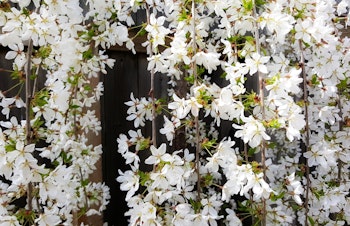
1. Weeping Cherry Tree - Snow Fountain
The Snow Fountain Weeping Cherry Tree is a stunning ornamental tree that is well-suited to the Bay Area's climate. This tree is cherished for its beautiful, cascading branches that create a dramatic, fountain-like effect, especially when covered with its abundant snow-white flowers in early spring. These blossoms not only provide a visual spectacle but also emit a delightful fragrance, enhancing the sensory experience of any garden.
The Snow Fountain Weeping Cherry can also be an attractive container plant if provided with a pot large enough to accommodate its mature size and with good drainage to prevent wet feet, which it does not tolerate well.
- Growth: height of 8 to 15 feet with a spread of 6 to 8 feet - ideal for small yards
- Other: year round interest, hardy, low-maintenance
- Light: full sun
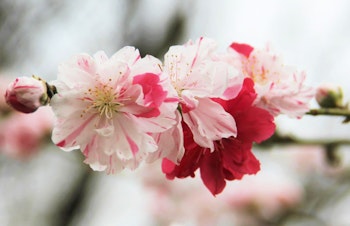
2. Prunus Flowering Peach Tree - Peppermint
The Prunus Flowering Peach, specifically the 'Peppermint' variety, is a deciduous tree known for its striking blooms and ornamental value. In the Bay Area of California, this tree can be a captivating addition to the garden, offering a rounded crown of dense foliage and impressive floral display. The blooms present a spectacular color palette, often striped in shades of white, pink, and rich rose-red, ensuring that each flower is uniquely patterned.
- Growth: Potential to reach heights and spreads of up to 20 feet
- Light: Full Sun

3. Flowering Japanese Apricot Mokel
The Japanese Flowering Apricot, also known as Prunus mume 'Mokel', is a tree celebrated for its early and blossoms, which can range from white to pink to red and offer a delightful fragrance of a cinnamon-spice aroma. It's well-suited for small gardens or near walkways in the Bay Area of California due to its picturesque form and manageable size.
- Growth: 20 feet tall and wide
- Light: full sun
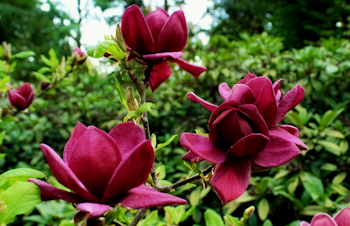
4. Magnolia - Genie
The Magnolia 'Genie' is known for its dramatic, deep maroon-purple buds that open to lightly fragrant pink flowers, which emerge on bare branches in early spring and can reappear in late summer. This tree is relatively compact, making it suitable for small gardens or as an accent next to patios.
- Growth: 10 to 15 feet in height and 5 feet in width
- Light: partial to full sun
- Other: deer and rabbit resistant
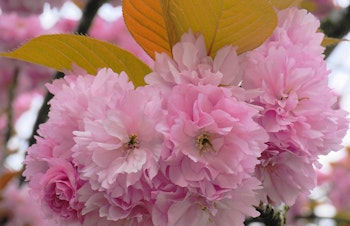
5. Flowering Cherry: Kwanzan
The Flowering Cherry 'Kwanzan' tree, known botanically as Prunus serrulata 'Kwanzan', is a deciduous tree that can be a stunning spring spectacle for gardens in the Bay Area of California. This variety is celebrated for its bright pink, double flowers that bloom profusely every April through May, providing a dramatic flair to any landscape. After the flowering season, the leaves undergo a beautiful transformation, starting as a bright green and changing to red, orange, and gold tones in the fall, offering year-round interest.
- Growth: 20-25 feet in height and 15-20 feet in width
- Light: prefers a sunny location that gets at least 6 hours of direct sunlight daily
Trees - Larger Selection!
Redbud Trees
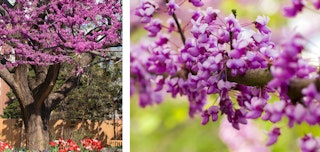
Oklahoma Redbud
Cercis canadensis var. texensis 'Oklahoma' - A wonderful landscape specimen valued for its profusion of vibrant, petite, purple-red flowers that cloak the bare branches to bridge the gap between winter and spring! Lustrous heart-shaped foliage emerges with a soft pink tinge as the flowers fade then matures to a rich green. May develop as a multi-trunk tree. Deciduous.
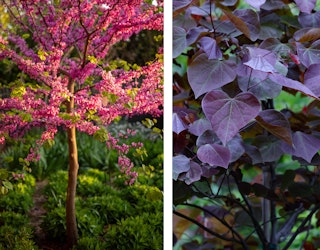
Forest Pansy Redbud
Cercis canadensis 'Forest Pansy' - Beautiful landscape tree valued for its brilliant scarlet-purple color to new foliage, maturing to maroon. Rosy-pink flowers on bare branches bridge the gap between winter and spring! Deciduous.
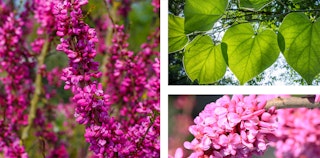
Avondale Redbud
Cercis chinensis 'Avondale' - One of the most profuse flowering of all redbuds. Very showy dark rose-purple flowers literally cover the stems of this small, sturdy branched tree in spring. Glossy, green, heart-shaped leaves fill the tree as the blooms fade. A thrilling spring specimen that easily fits into smaller landscapes and is well-adapted to containers. Deciduous.
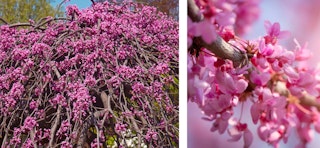
Lavender Twist® Redbud
Cercis canadensis 'Covey' - Rosy lavender-pink flowers completely cover bare, slightly contorted, weeping branches in early spring. This truly unique selection can develop a beautiful umbrella of cascading branches covered in heart-shaped leaves if trained when young. A captivating small specimen tree for a focal point in a shrub border or entryway. Deciduous.
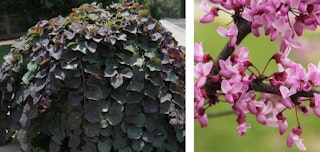
Ruby Falls Weeping Redbud
Cercis canadensis 'Ruby Falls' - A lovely compact redbud tree with a weeping canopy that is perfect for a smaller-sized landscape. An excellent specimen plant with clusters of lavender-red, sweet pea-like blooms in spring. Small, semi-glossy, heart-shaped leaves turn yellow in fall. Deciduous.
Care: Follow a regular watering schedule during the first growing season to establish a deep, extensive root system. Watering can be reduced after establishment. Feed with a general purpose fertilizer before new growth begins in sprin. Prune in winter.
Flowering Cherry Trees
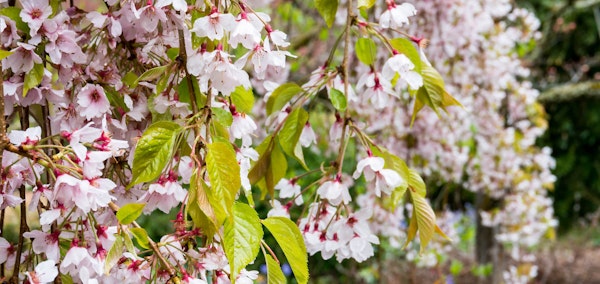 Double Weeping Rosebud Cherry – Prunus pendula 'Pleno-rosea' - Graceful, long weeping boughs sway like willows in the breeze, densely packed with large magenta buds that open to perfect double pink flowers in spring. Blooms later than some, making it less prone to bud damage from a late season cold snap. Plant as a focal point or use pairs to frame entries. Deciduous.
Double Weeping Rosebud Cherry – Prunus pendula 'Pleno-rosea' - Graceful, long weeping boughs sway like willows in the breeze, densely packed with large magenta buds that open to perfect double pink flowers in spring. Blooms later than some, making it less prone to bud damage from a late season cold snap. Plant as a focal point or use pairs to frame entries. Deciduous.
- Light: Full Sun
- Water: Regularly - weekly, or more often in extreme heat
- Average Landscape Size: Slowly reaches 15 to 20 feet tall and as wide
- Uses: Mass Planting, Specimen, Urban Garden, Wildlife Garden
Care: Prefers slightly acidic, moist, well-drained soils. Water deeply and regularly during the first growing season to establish an extensive root system; reduce frequency, once established. Apply fertilizer before new growth begins in spring. For a tidy, neat appearance, prune annually to shape.
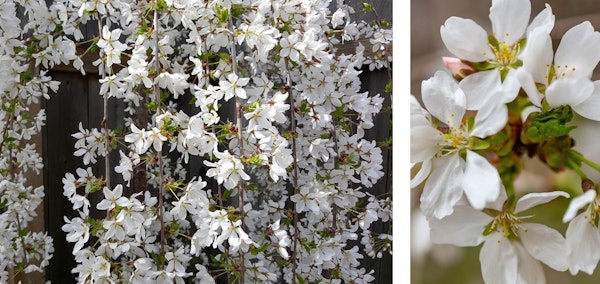 Snow Fountains® Weeping Cherry Prunus x 'Snowfozam' - Naturally weeping branches are covered with showy, snow white flowers on this magnificent, compact, hardy specimen for the landscape. Red ornamental fruit follows in summer. Very disease and insect resistant. A beautiful small yard tree. Exquisite in Japanese style or nature inspired gardens. Deciduous.
Snow Fountains® Weeping Cherry Prunus x 'Snowfozam' - Naturally weeping branches are covered with showy, snow white flowers on this magnificent, compact, hardy specimen for the landscape. Red ornamental fruit follows in summer. Very disease and insect resistant. A beautiful small yard tree. Exquisite in Japanese style or nature inspired gardens. Deciduous.
- Light: Full sun
- Average Landscape Size: Moderate growing; reaches 8 to 15 ft. tall, 6 to 8 ft. wide
- Uses: Specimen, container, urban garden
Care: Provide humus-rich, well-drained soil. Water deeply and regularly during the first growing season to establish an extensive root system; reduce frequency, once established. Feed with a general purpose fertilizer before new growth begins in spring. Prune for shape and structure after flowering.
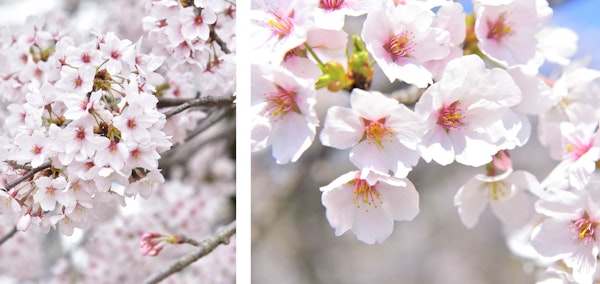 Mount Fuji Japanese Flowering Cherry – Prunus serrulata 'Mount Fuji' - A magnificent show-stopper with showy clusters of fragrant white flowers backed by bronze-tinged new foliage. Works well as a single specimen or lawn tree in smaller landscapes or in groves for magnificent impact in larger landscapes. Excellent for use as a shade tree. Deciduous.
Mount Fuji Japanese Flowering Cherry – Prunus serrulata 'Mount Fuji' - A magnificent show-stopper with showy clusters of fragrant white flowers backed by bronze-tinged new foliage. Works well as a single specimen or lawn tree in smaller landscapes or in groves for magnificent impact in larger landscapes. Excellent for use as a shade tree. Deciduous.
- Light: Full sun
- Average Landscape Size: Moderate growing; reaches 20 ft. tall, 25 ft. wide.
- Uses: Mass Planting, Specimen, Woodland Garden, Coastal Exposure, Wildlife Garden, Urban Garden
Care: Follow a regular watering schedule during the first growing season to establish a deep, extensive root system. Watering can be reduced after establishment. Feed with a general purpose fertilizer before new growth begins in spring. Prune in winter.
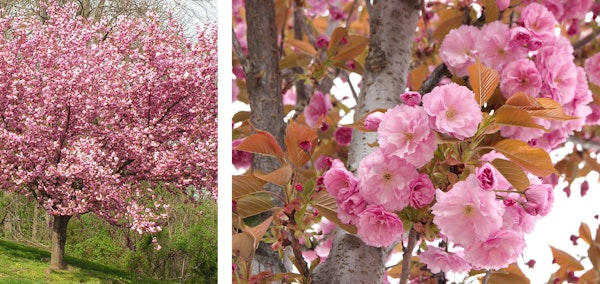 Kwanzan Flowering Cherry Prunus 'Kwanzan' - This flowering cherry is grafted with paperbark cherry as the interstem, resulting in a trunk with shiny mahogany red bark that peels as it ages. Superb lawn tree that puts on an early season show with clusters of large, double deep pink blooms backed by bronze-red new growth. Upright, vase-shaped branching habit. Deciduous.
Kwanzan Flowering Cherry Prunus 'Kwanzan' - This flowering cherry is grafted with paperbark cherry as the interstem, resulting in a trunk with shiny mahogany red bark that peels as it ages. Superb lawn tree that puts on an early season show with clusters of large, double deep pink blooms backed by bronze-red new growth. Upright, vase-shaped branching habit. Deciduous.
- Light: Full sun
- Average Landscape Size: Moderate grower to 20 to 25 ft. tall, 15 to 20 ft. wide.
- Uses:Specimen, Woodland Garden, Urban Garden
Care: Follow a regular watering schedule during the first growing season to establish a deep, extensive root system. Watering can be reduced after establishment. Feed with a general purpose fertilizer before new growth begins in spring.
Magnolias
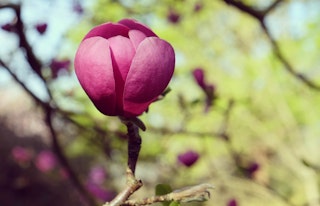
Black Tulip™ Magnolia
Magnolia x soulangiana 'Jurmag1' - This is the darkest, most dramatic tulip magnolia of any on the market, with rich, deep burgundy-red six-inch-wide blooms that appear before the foliage emerges in early spring. The small, slender, multi-branched form is outstanding for use as an elegant specimen tree, en masse to form a hedge, or as a container plant. Deciduous.
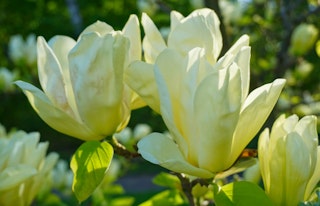
Magnolia Elizabeth
Magnolia x 'Elizabeth' - A stunning yellow-flowered Magnolia, with a profusion of elegantly tapered buds that open to large, fragrant, primrose-yellow blooms in spring. Blooms are replaced by large, dark green leaves on the neat, upright, pyramidal form. Well-suited for use as a landscape specimen, and a wonderful shade tree with its wide-spread branches. Deciduous.
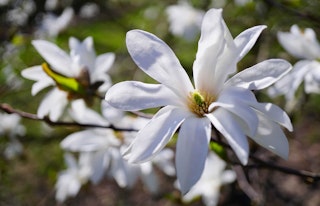
Royal Star Magnolia
Magnolia stellata 'Royal Star' - An early bloomer with large, fragrant, white, double flowers appearing before the foliage emerges in spring. A springtime thriller that will add a nice touch to the landscape as the seasons progress. Useful as an open-branched, multi-trunked large shrub or as a small specimen tree. Excellent cold and heat tolerance for a magnolia. Deciduous.
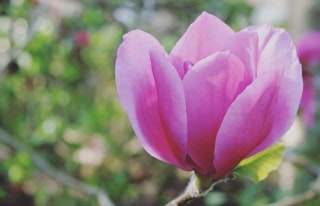
Felix® Magnolia
Magnificent 12-inch, highly fragrant hot pink flowers add exceptional beauty to the early spring landscape - as many as 100 blooms on a single mature tree each year. Its smaller stature with an upright, pyramidal form and attractive light green foliage is perfect for a small garden specimen tree or to accent larger landscapes. Deciduous.
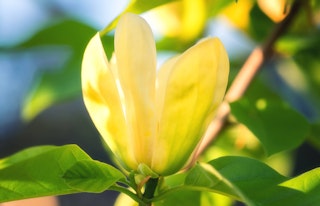
Sunsation Magnolia
Magnolia 'Sunsation' - A spectacular spring display awaits, with 7-inch tulip-shaped blooms that blush with shades of gold and pink. Flowers are replaced with large green leaves. The narrow, upright, pyramidal form is an excellent vertical accent or shade tree for smaller landscapes. Deciduous.
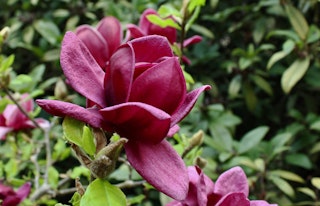
Genie Magnolia
Magnolia soulangeana x liliflora 'Genie' - This small, pyramidal tree is the perfect way to bring dramatic spring blooms into a small garden. Stunning, deep maroon-purple, lightly fragrant flowers open on bare branches in early spring, holding, as the green leaves emerge, until early summer. Blooming repeats in late summer. A wonderful accent in shrub borders or next to patios.
Care: Provide deep, organically rich, acidic, evenly moist, well-drained soil; does not tolerate heavy, wet soils or drought. Water deeply, regularly during the first few growing seasons to establish an extensive root system; once established, reduce frequency, but continue to water deeply. Apply fertilizer before new growth begins in spring.
Formula For Happy Trees and Shrubs...

- Redi-Gro Mulch (2 cuft. Bag) -A natural forest product that not only looks great and is colorful for decorative landscaping, it saves water!
- SummerWinds Planting Mix (2 cuft. Bag) -This all-purpose, Organic transplanting mix is ideal for all types of flowers, vegetables and ornamentals, including annuals, perennials, ground covers, shrubs, fruit and shade trees.
- E.B. Stone Organics - Sure Start (4 lb.) - is a blend of natural organic ingredients formulated to help newly transplanted plants develop strong roots and sturdy growth. Sure Start is rich in natural sources of phosphorus to help your plants develop a strong foundation for future growth. Their gentle and non-burning formula is safe to use with even the most tender transplants. Contains: Blood Meal, Feather Meal, Bone Meal, Dried Chicken Manure, Bat Guano, Alfalfa Meal, Kelp Meal, Potassium Sulfate, Humic Acids and Soil Microbes including Mycorrhizal Fungi.
For Your Success...
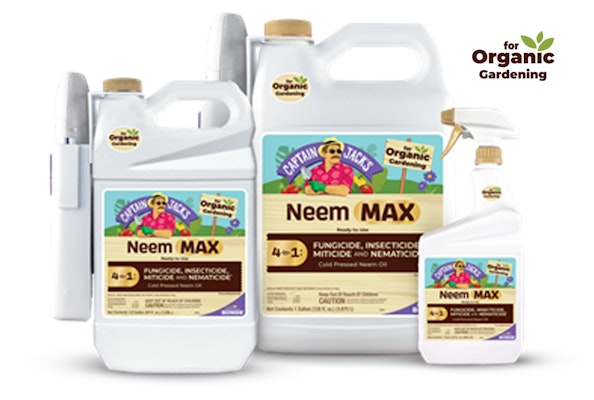 Bonide Neem Oil
Bonide Neem Oil
For Organic Gardening - This all-purpose insecticide, miticide, and fungicide is derived from the Neem seed. Safe to use on roses, flowers, vegetables, herbs, spices, houseplants, trees, turf and shrubs. Kills all stages of insects including eggs, larvae, and adults.
- Controls insects, diseases and mites
- Approved for organic gardening
- Kills insect eggs, larvae and adults
- Controls black spot, powdery mildew, rust and more
- Kills mites, aphids, whiteflies and more
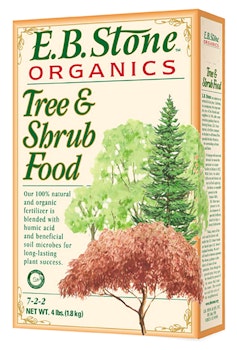 E.B. Stone Organics Tree & Shrub Food
E.B. Stone Organics Tree & Shrub Food
E. B. Stone Organics Tree & Shrub Food is a blend of select natural and organic ingredients for use with a wide variety of trees and shrubs including Japanese Maples. It is formulated to encourage lush green foliage and to support bountiful flower production. E.B. Stone Tree & Shrub Food is rich in nitrogen, which is essential for all woody plants in most landscape situations. It also contains phosphate and potash, which are important for flowering and the overall vigor of your plants. E. B. Stone Tree & Shrub Food is also suitable for use with ornamental vines. It is blended with humic acid and beneficial soil microbes including mycorrhizae. NPK: 7-2-2 Derived from: Blood Meal, Feather Meal, Bone Meal, Dried Chicken Manure, Bat Guano, Alfalfa Meal, Kelp Meal and Potassium Sulfate.
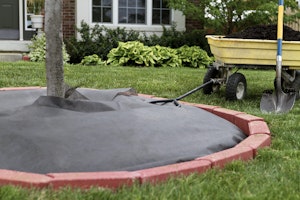 Weed Barrier Cloth
Weed Barrier Cloth
Protect your trees and shrubs early by applying a layer of weed cloth when planting your trees or shrubs. A little preventative measure early on will save water and your time pulling those ugly weeds in the future.

